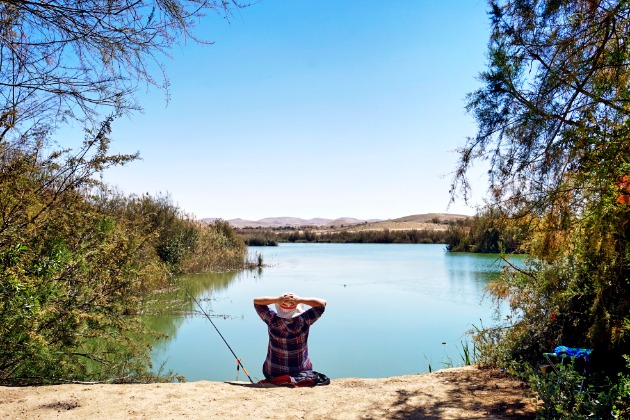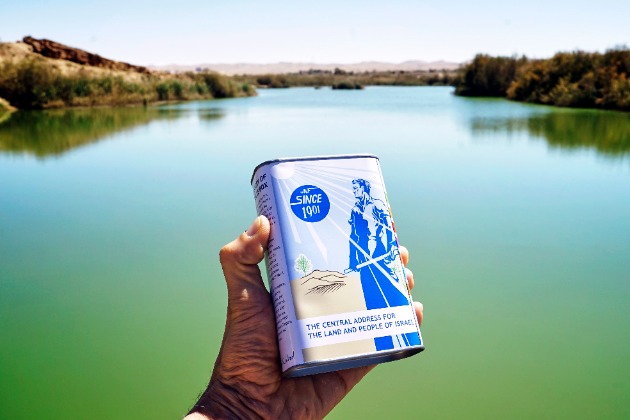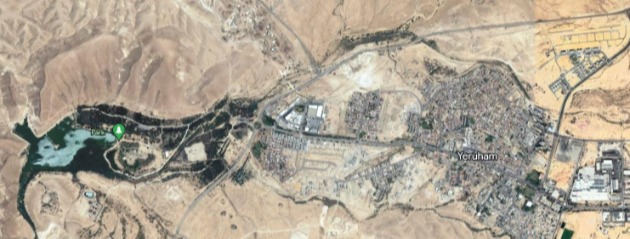By Celia Theller
In a little out-of-the-way corner in Israel’s Northern Negev Desert, just outside the town of Yerucham is a manmade lake surrounded by green groves filled with birds and picnic benches.
Known as the Yerucham Lake Park, the desert oasis now provides solace for humans and animals alike. However, it wasn’t always this way.

Yerucham River Park
Yerucham was established as part of Israel’s “development town” program in the 1950s. Here, Jewish refugees from Arab countries as well as Holocaust survivors and other new olim (immigrants to Israel) were settled as part of a plan to populate the country’s frontier regions. Unfortunately, Yerucham like many other development towns remained in “development mode,” without the necessary resources to achieve a high quality of life for its residents.
Until now.
The Yerucham Lake Park was first created in a local streambed in the late 1950s with the construction of a dam meant to utilize its floodwaters for irrigation and to create a water tourist attraction. However, the irrigation was found to be unnecessary, and the lake slowly fell into disrepair.
During these first decades of the State of Israel, rivers, and environmental protection in general, weren’t prioritized as citizens worked to establish the necessary infrastructure to absorb the influx of new immigrants arriving to the nascent state.
At the time, there was a consensus that the country’s rivers should serve agriculture and the economy, which led to open sewer canals and municipal dumps being created downstream as upstream tributaries were pumped into agricultural fields.
Today, Jewish National Fund-USA’s philanthropic investments are reversing the damage done to Israel’s rivers through restoration projects across the country, including the Be’er Sheva River Park and Lake, Hadera River, Harod River, and now the Yerucham River Park.

Yerucham Blue Box
Following the success of its 23-acre manmade Be’er Sheva River Park project, Jewish National Fund-USA turned its hand to the creation of the Yerucham River Park.
After the rehabilitation of Yerucham’s local streambed lake following years of neglect in the early 1990s—including the construction of a water purification plant on the outskirts of the town—the Yerucham River Park has become a popular recreational site for local residents as well as a magnet for birdwatching enthusiasts.
Bob Weiss, Vice president of Jewish National Fund-USA’s New York Board and immediate past- Co-chair of the organization’s Central Negev task force, noted that the movement’s involvement in the Yerucham River Park goes back many years as a project for building community sustainability in the Negev area – in part to attract new residents from the country’s crowded central cities.
The town of Yerucham is rapidly expanding, and some 300 new housing units are under construction, Weiss explained, with several bridges connecting the existing town to the new housing development over the riverbed. In the last several months construction has begun on the portion of the park which lies between the existing town and the new housing area.
Weiss noted that unlike the neighboring Be’er Sheva River Park, which was used as a garbage dump right in the center of town and before its rehabilitation was a source of contamination to the water table, the Yerucham River Park is being established along a dry desert wadi, or riverbed, where nothing existed before on the periphery of the town.
“We are creating the park on virgin territory using learnings acquired by Jewish National Fund-USA from building the Be’er Sheva park to ensure that the Yerucham River Park provides the same kind of amenities,” said Weiss. “In Be’er Sheva people want to live near the park, and we believe the same will occur in Yerucham because it borders both the existing town as well as the new housing units.”
Ninety percent of the water in the Yerucham Lake, which will be used to feed the riverbed, is recycled water of treated wastewater and cleaned rainwater.
“We have the same idea of creating a beautiful and permanent area where people can take walks, with parks and playgrounds for children, including those with disabilities,” said Weiss.
He also noted that in line with the sustainability of maintaining the lake, the river will not flow with water all year round, similar to other natural riverbeds founds throughout the Negev.
“According to the plan, we will not drain the lake to feed the river,” he said. “There are, however, times during the year when there is sufficient water flow to feed a small river or stream which will go through part of the park.”
Though the park goes through the desert, making the desert amenable for recreation does not necessarily mean filling it up with water, Weiss explained. “It means making better trails, cultivating appropriate plants, providing good drainage so water is used efficiently, and making the road and trail system more accessible so people can easily get to and use it.

Yerucham satelite photo highlighting the River Park on the left
Operating in the spirit of David Ben Gurion’s vision to settle, develop, and preserve the Negev, Yerucham still faces the challenge of encouraging residents to stay and raise their families.
“Previously, there were few compelling reasons to stay in Yerucham. It was one of a string of development towns, but with 300 new housing units and a significant boost of amenities provided by the park, we think the town’s population will at least double in the next decade, which is consistent with our vision for the Negev,” he said.
And Weiss has good reason to be optimistic. As Yerucham enters a new chapter, philanthropists like him continue to work hand in hand with the town’s residents to ensure that a brighter future will arrive for them and future generations to come.
For more information or to support Jewish National Fund-USA's philanthropic investments in water, visit jnf.org/water.
